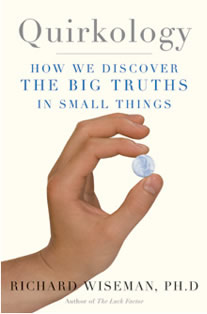THE SANTA EFFECT
 In
December 2007, Quirkology teamed up with The Daily Telegraph to explore
the psychological impact of white beards. Roger Highfield, Science Editor
of the Telegraph, described the experiment and results in an article here,
and in in the summary below:
In
December 2007, Quirkology teamed up with The Daily Telegraph to explore
the psychological impact of white beards. Roger Highfield, Science Editor
of the Telegraph, described the experiment and results in an article here,
and in in the summary below:
Generous, cheerful and caring. These are the qualities we associate with
Father Christmas, but we might have to think again. Exclusive research
carried out for The Daily Telegraph has shown that the jolly fat man is
in desperate need of a makeover if his charitable image is to persist
into the 21st century.
When we think of Santa, we think of his beard. One can trace the famous
growth back to iconic images of Saint Nicholas of Myra (circa 270-343),
the primary inspiration for the Christian figure of Father Christmas.
Billowing, white and luxuriant, it has been tugged by countless children
and stroked endlessly by its owner as he ponders who has been good, who
has been bad and just how to deliver all those presents.
But now, after analysing more than 5,000 results from our pioneering online
experiment, Professor Richard Wiseman of the University of Hertfordshire
has come to a radical conclusion: the beard should go, because those bristles
send out unseasonal signals.
Two weeks ago, we asked our readers to go to a website to judge three
faces on several qualities, including intelligence, cheerfulness and generosity.
Although they did not realise it, the thousands of people who took part
were being probed on their attitudes to facial hair; some of the faces
were clean-shaven, while others had beards added using a computer.
Prof Wiseman discovered that beards have a huge effect on how people are
seen. When compared with the clean-shaven, those sporting white beards
are seen as less generous (by 28 per cent), cheerful (39 per cent) and
caring (29 per cent). "When it comes to the relationship between
perceived personality and facial hair, beards matter - and the effects
are mainly negative," says Prof Wiseman. Therefore, a shaven Santa
"would be much better".
A bare face could also be good for Saint Nick in other ways. "Given
that other experiments suggest that perceiving a person in a certain way
can act as a self-fulfilling prophecy, taking off his beard might actually
make him more generous, which would be good for all of us in terms of
the amount of presents we get."
What other signals could Santa's beard send? As Prof Wiseman points out,
throughout history men with facial hair have been thought to possess wisdom,
sexual virility or high status.
A famous 1973 study by the psychologist Robert Pellegrini investigated
the effects of facial hair on perceived personality, using eight young
men with full beards who were happy to have them gradually removed in
the name of science.
"There was a positive relationship between the amount of beard, and
adjectives such as masculine, mature, dominant, self-confident, and courageous,"
reveals Prof Wiseman.
But there have been some worrying signs that beards are sending out a
sinister semaphore. Recent surveys show that more than half of the Western
public believe clean-shaven men to be more honest than those with facial
hair.
"Apparently, beards conjure up images of diabolical intent, concealment,
and poor hygiene," says Prof Wiseman. "Although there is absolutely
no relationship between honesty and facial hair, the stereotype is powerful
enough to affect the world - perhaps explaining why everyone on the Forbes
100 list of the world's richest men is clean-shaven, and why no successful
candidate for the American presidency has had a beard or moustache since
1910."
But at least there was one consolation for Father Christmas in our survey
- if we distrust those with white beards, the effect is even worse for
those who have not gone grey. People with dark beards are seen as far
less generous (a drop of 38 per cent), cheerful (51 per cent) and caring
(36 per cent).
There was one other surprise in our findings: the beard has no effect
in terms of perceived intelligence, undermining the stereotype of the
clever beardie established by famously hirsute thinkers such as Hippocrates,
Pasteur, Freud and Darwin.


